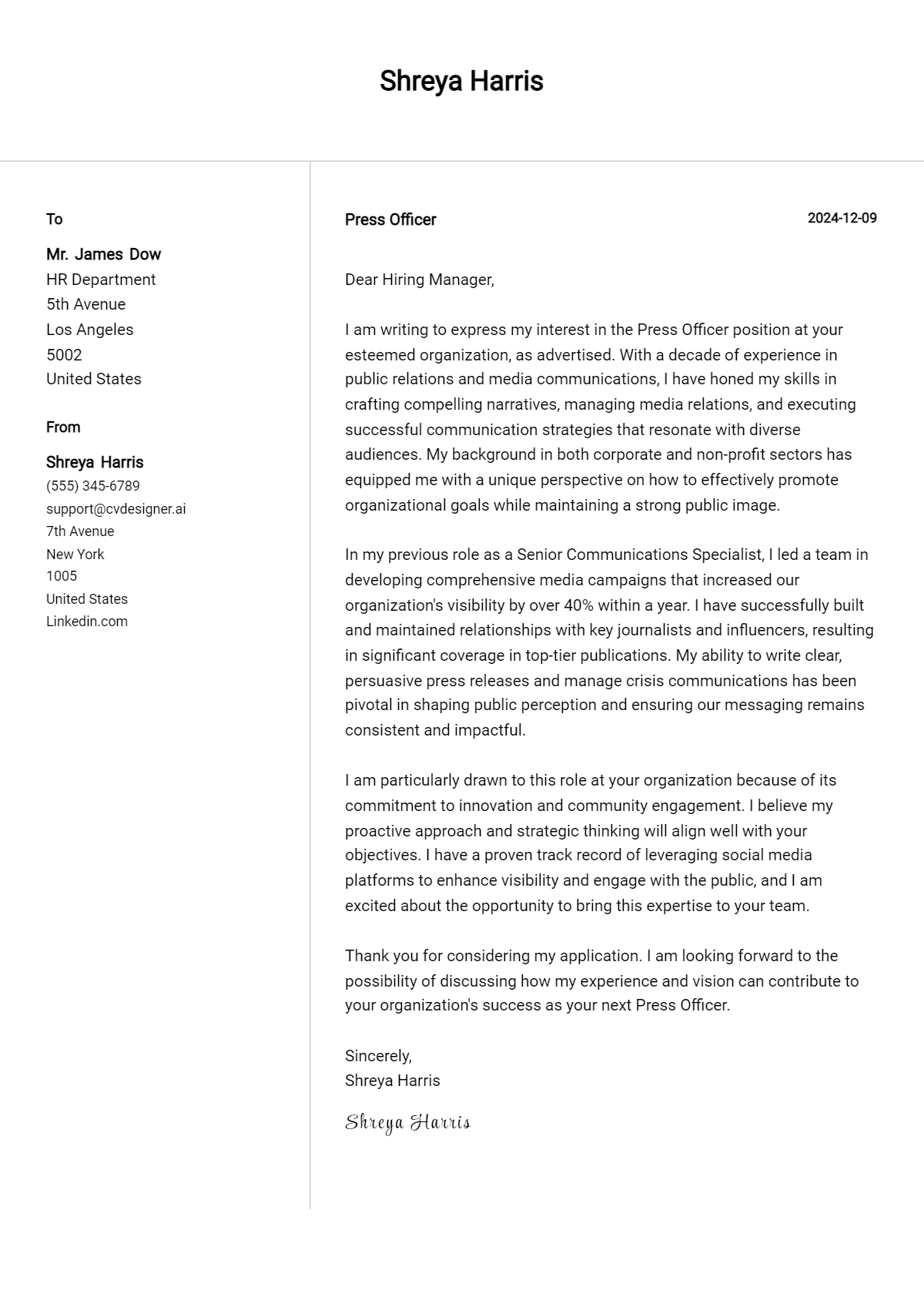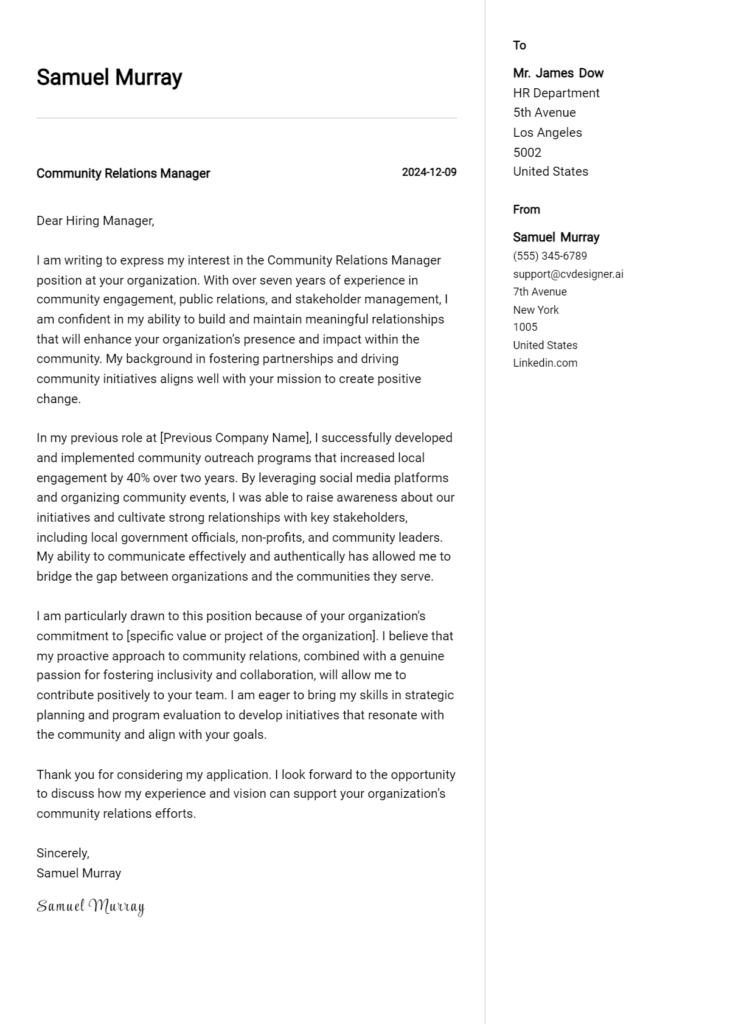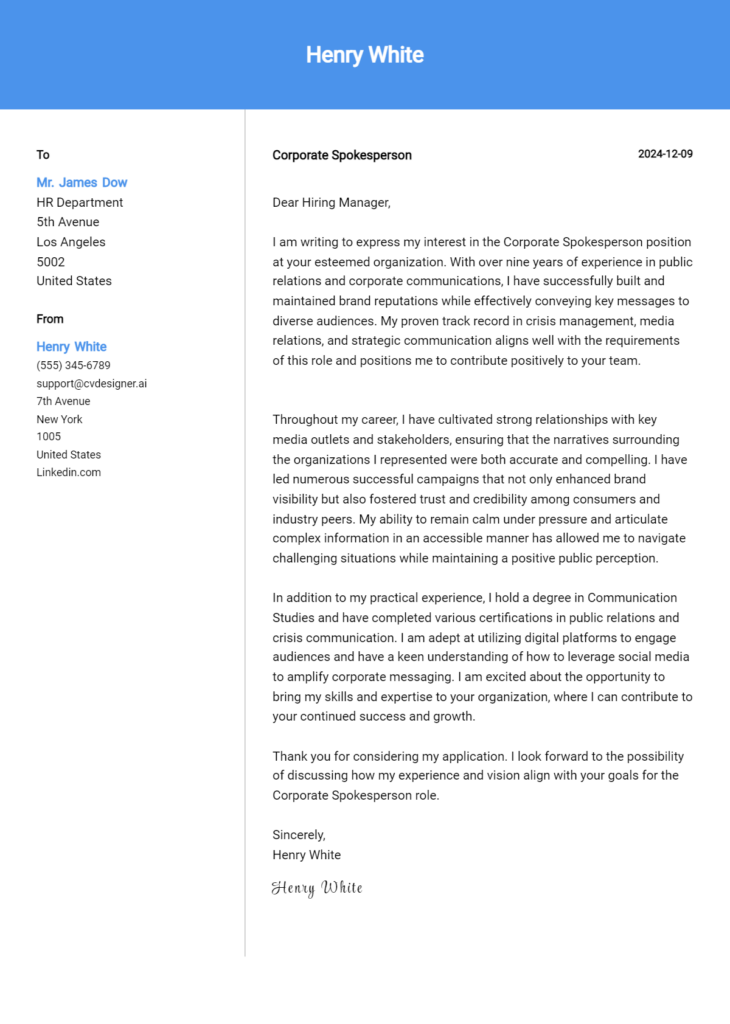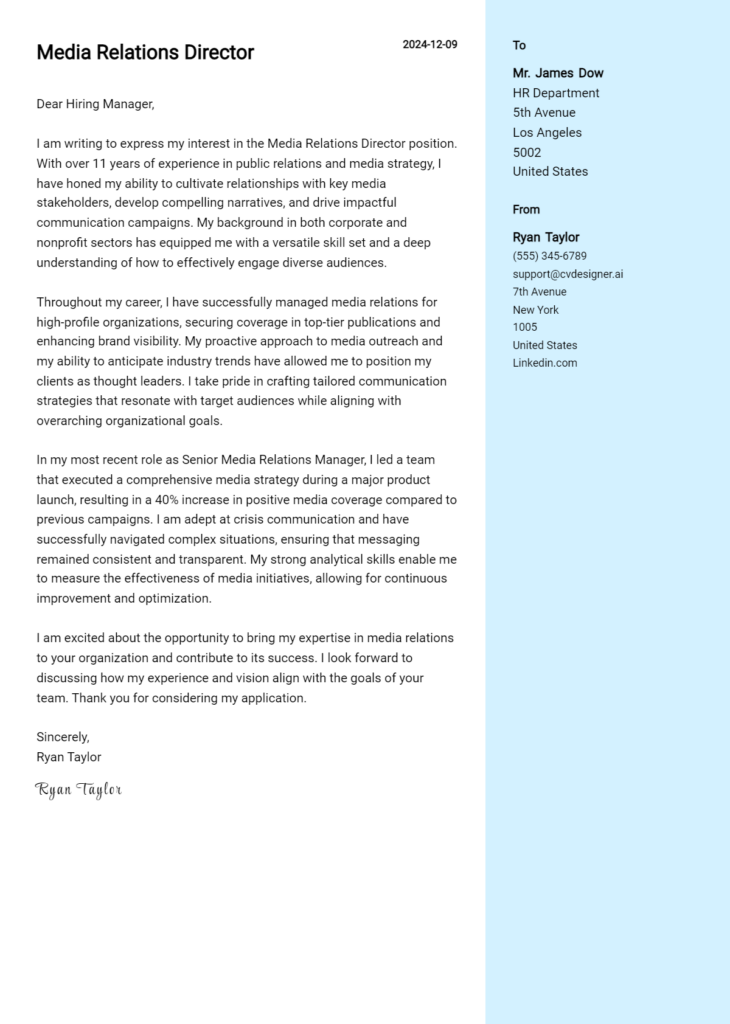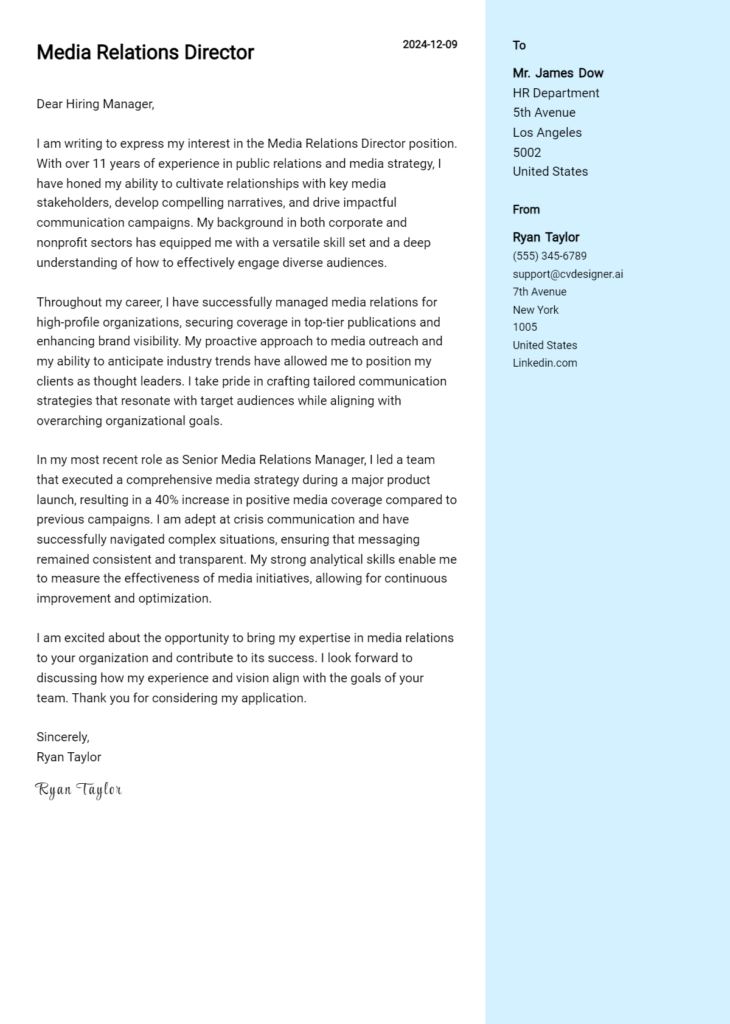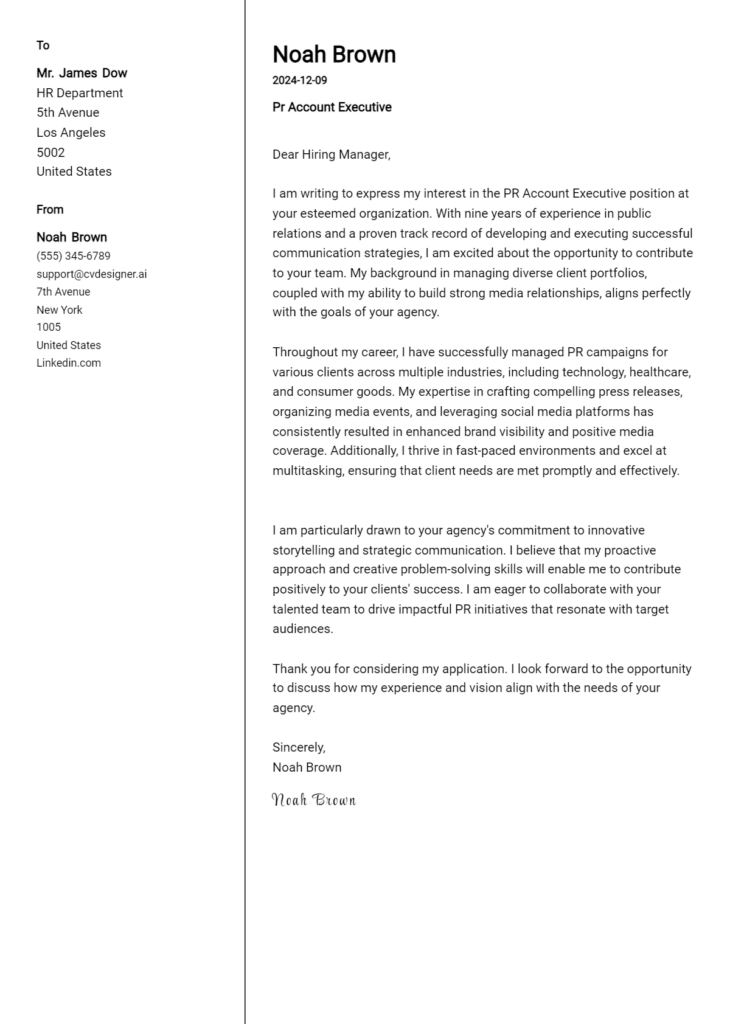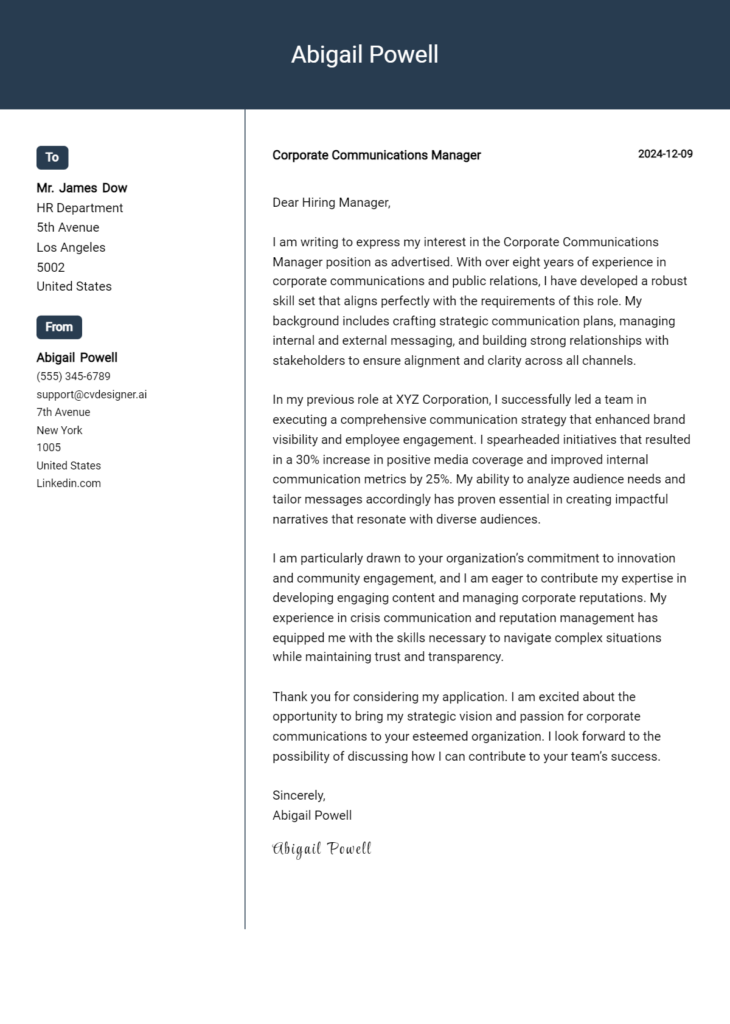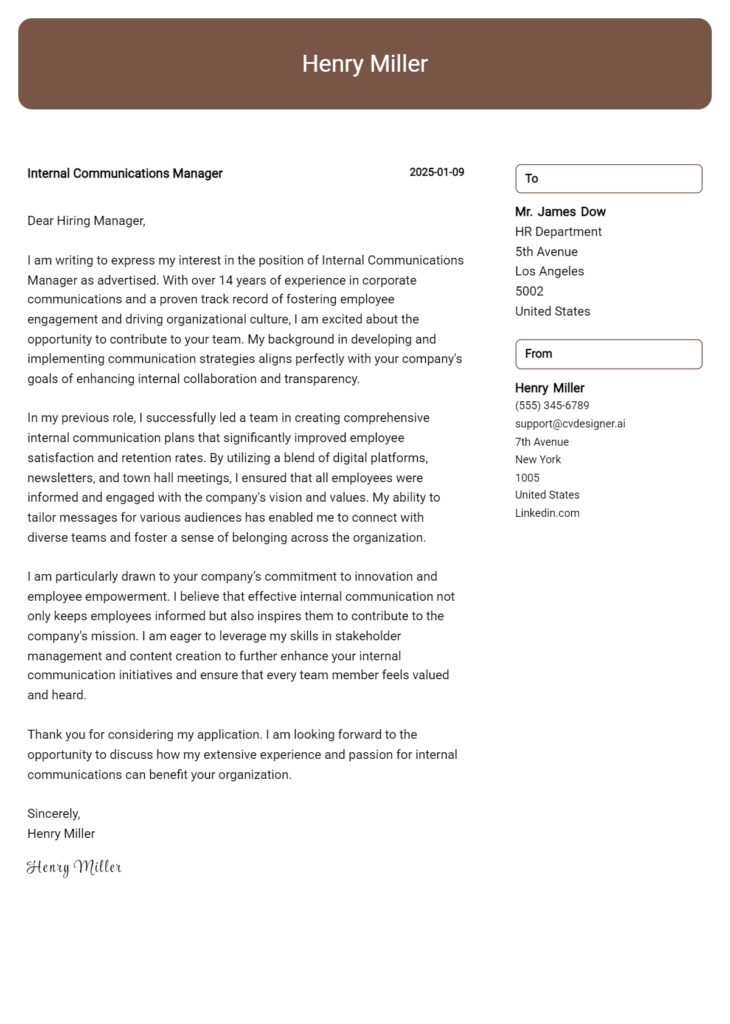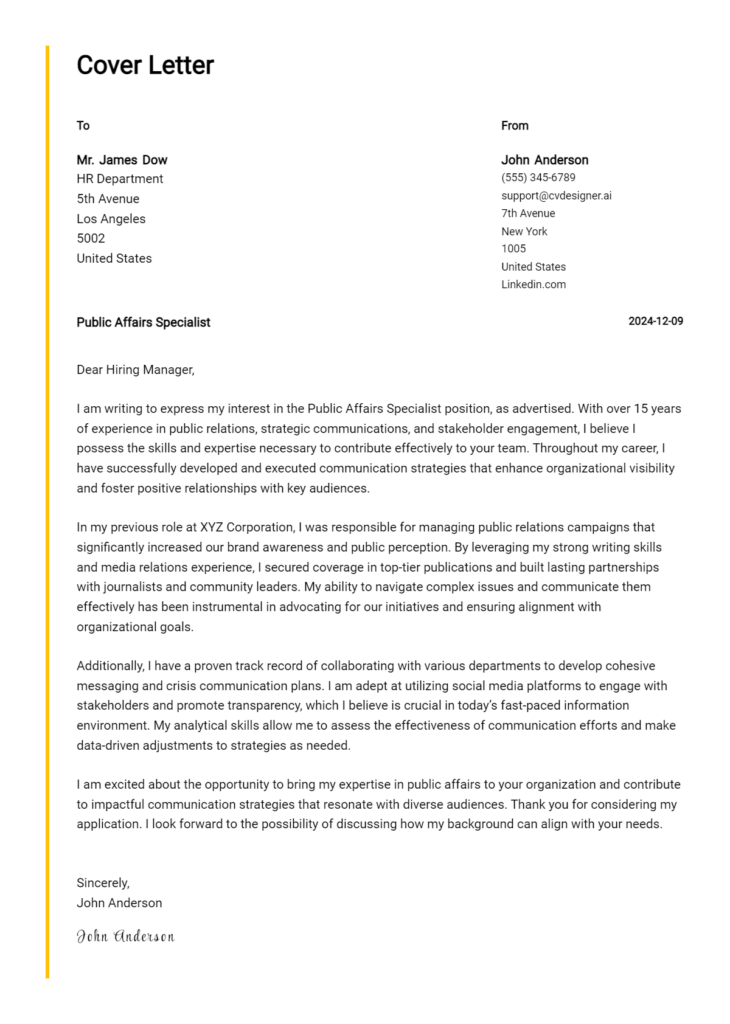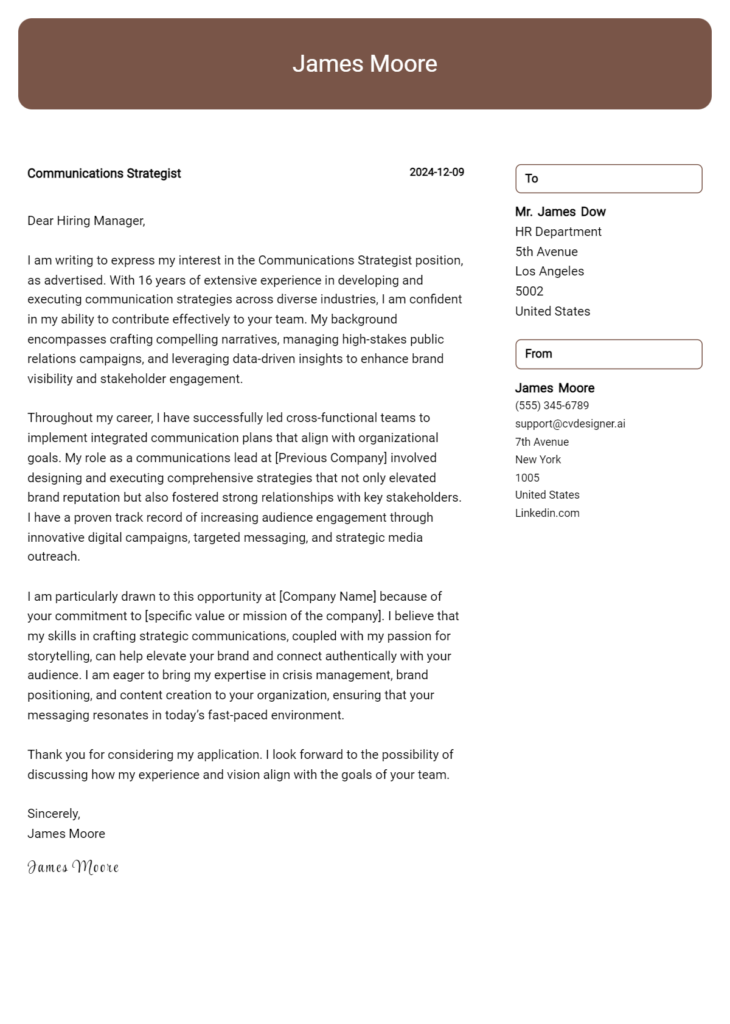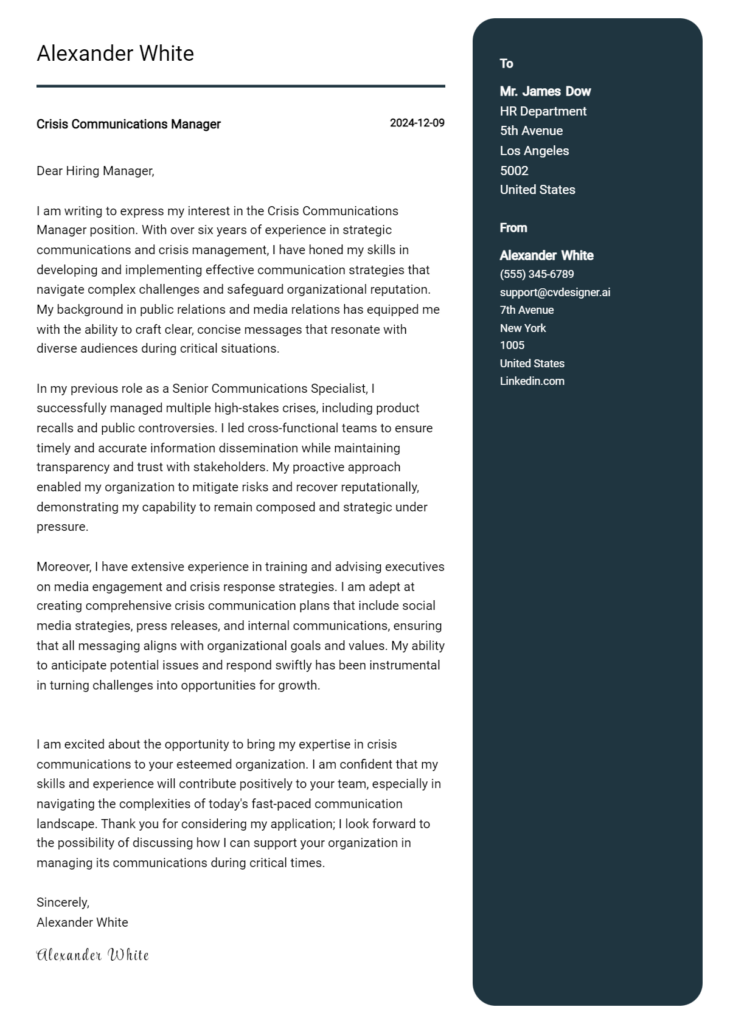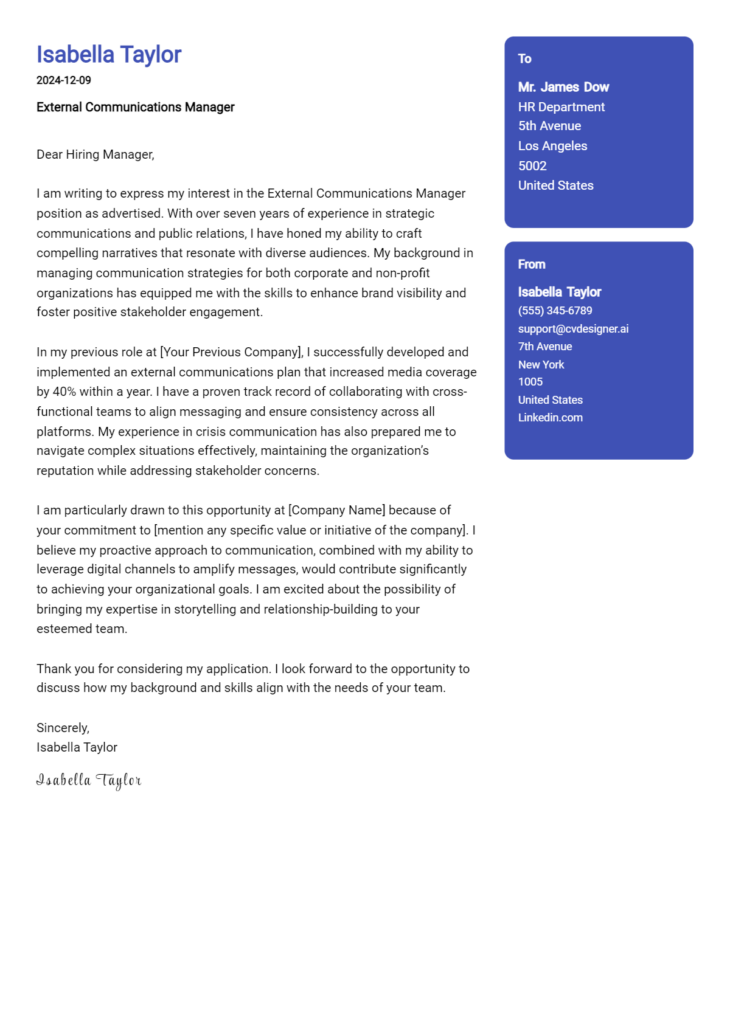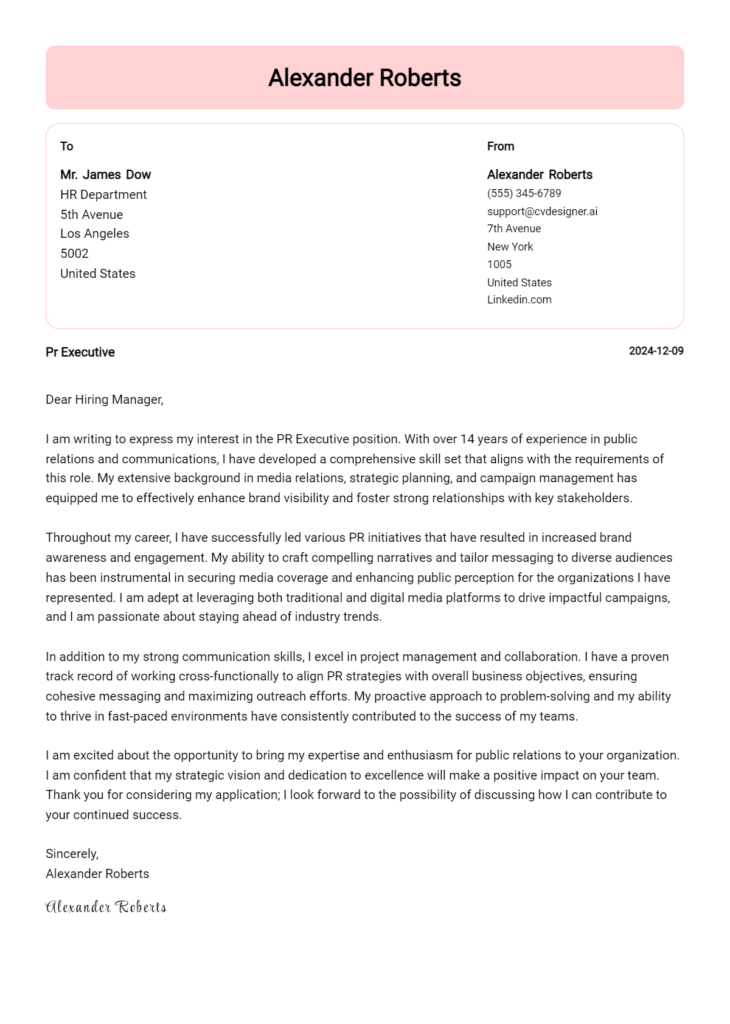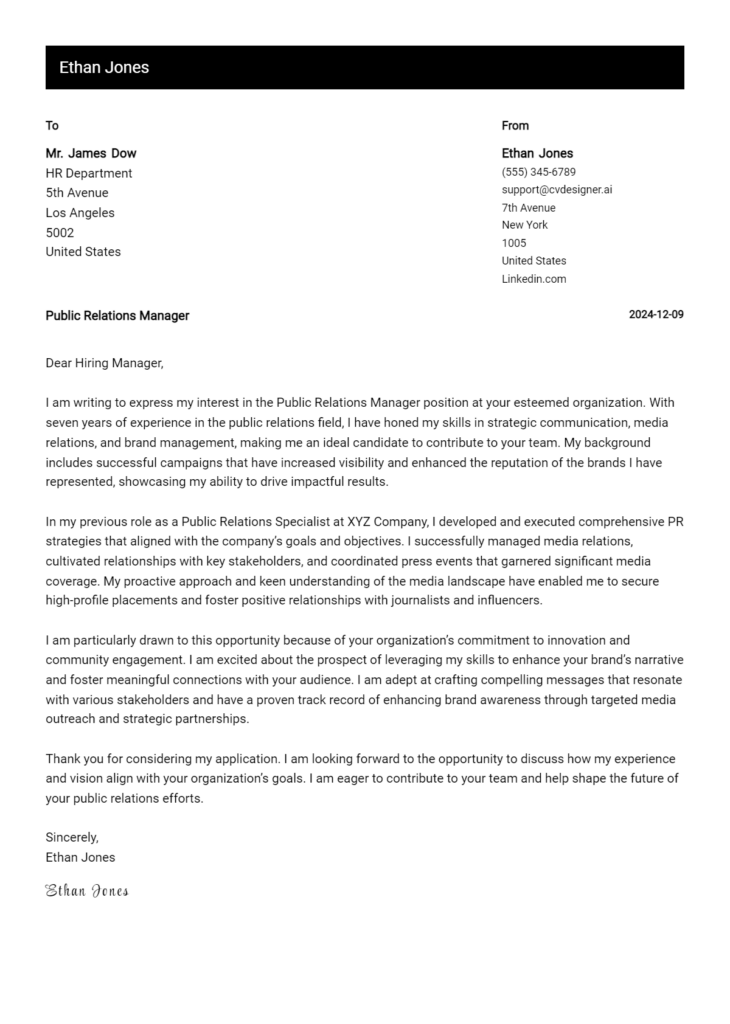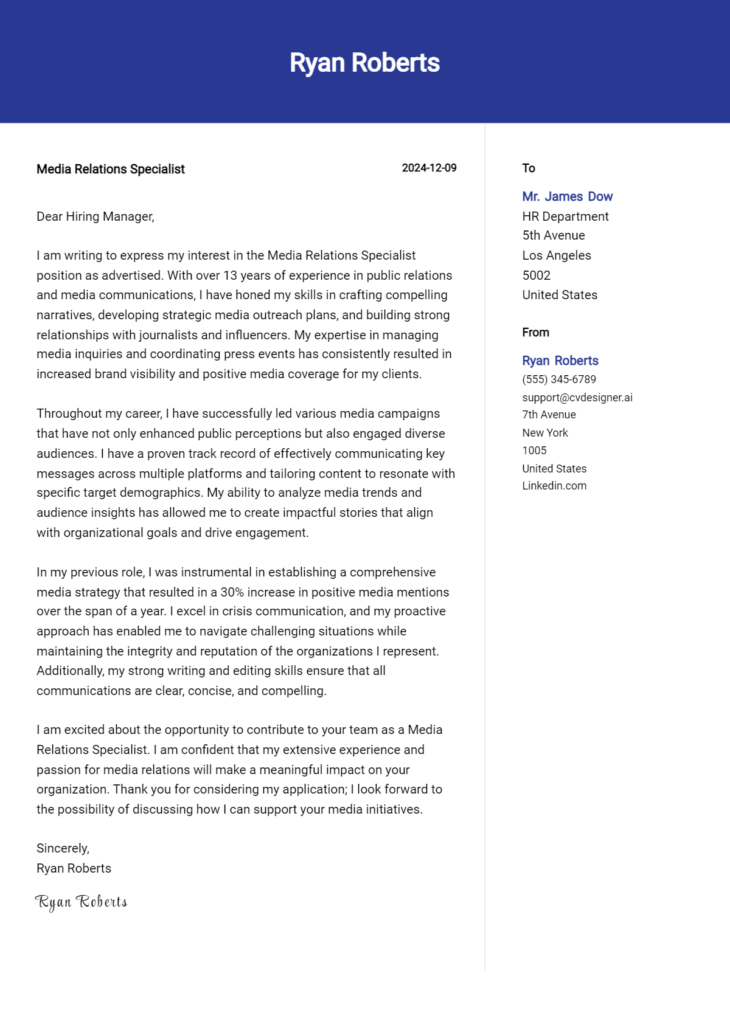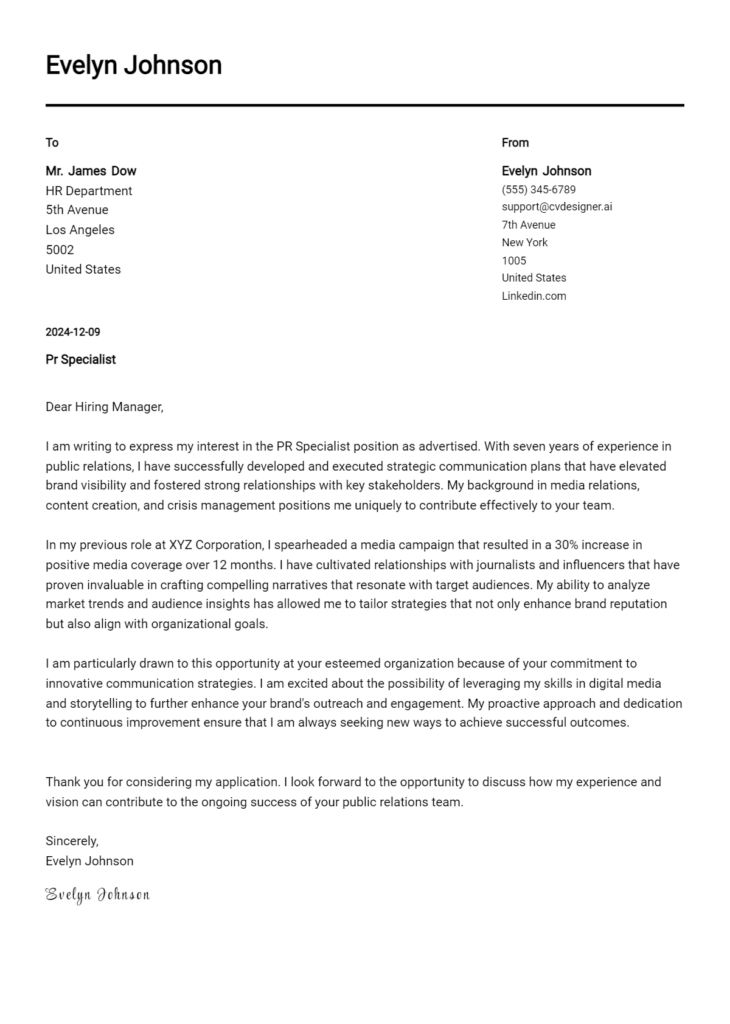Press Officer Cover Letter Examples
Explore additional Press Officer cover letter samples and guides and see what works for your level of experience or role.
How to Format a Press Officer Cover Letter?
Crafting a compelling cover letter for a Press Officer position goes beyond merely listing qualifications; it serves as a first impression of your communication skills and public relations expertise. The way you format your cover letter is essential, as it reflects your ability to convey messages clearly and effectively—traits that are critical for a successful Press Officer. A well-structured cover letter not only captures the attention of hiring managers but also demonstrates your professionalism and attention to detail.
In this guide, we’ll explore how to structure your cover letter, providing insights and examples tailored for aspiring Press Officers.
We will focus on the essential components of a professional cover letter, including:
- Cover Letter Header
- Cover Letter Greeting
- Cover Letter Introduction
- Cover Letter Body
- Cover Letter Closing
Each section is integral to showcasing your qualifications and capabilities. Let’s break down each part to help your Press Officer cover letter stand out.
Importance of the Cover Letter Header for a Press Officer
The cover letter header is a crucial component of any job application, particularly for a Press Officer, as it sets the tone for professionalism and clarity. A well-structured header not only provides essential contact information but also establishes the credibility of the applicant. It should include the applicant's name, address, phone number, email, the date, and the recipient's details, ensuring that the letter is easily traceable. A clear and professional header reflects the applicant's attention to detail—an essential quality for a Press Officer who must communicate effectively on behalf of an organization.
Strong Example:
Jane Doe 123 Media Lane Cityville, ST 12345 (123) 456-7890 jane.doe@email.com October 1, 2023 Mr. John Smith Director of Communications XYZ Corporation 456 Industry Ave Townsville, ST 54321
Weak Example:
jane doe email: jane.doe@email.com 1st October 2023 To whom it may concern
The Importance of a Strong Cover Letter Greeting for a Press Officer
The greeting of your cover letter is crucial as it sets the tone for the entire document and reflects your professionalism. A well-crafted greeting demonstrates your attention to detail and respect for the hiring manager by addressing them directly. Personalizing your greeting can create a positive first impression and show that you've taken the time to research the company and its staff. To avoid generic greetings, make an effort to find the recipient's name through the company's website or LinkedIn. This small step can significantly enhance the impact of your application.
Strong Greeting Example
Dear Ms. Johnson,
Weak Greeting Example
To Whom It May Concern,
The Importance of a Compelling Cover Letter Introduction for a Press Officer
A well-crafted cover letter introduction is crucial for a Press Officer role, as it serves to immediately capture the hiring manager’s attention and set the tone for the rest of the application. This opening paragraph should not only express the candidate’s enthusiasm for the position but also succinctly highlight relevant skills or notable achievements that align with the job requirements. An engaging introduction can distinguish an applicant from a sea of candidates and effectively convey their potential value to the organization.
Strong Example of a Cover Letter Introduction
Dear [Hiring Manager's Name], I am excited to apply for the Press Officer position at [Company Name], as I have long admired your innovative approach to public relations and media engagement. With over five years of experience in strategic communications and a proven track record of crafting compelling press releases that have garnered national media coverage, I am confident in my ability to enhance your organization's visibility and reputation. My passion for storytelling and my adeptness at building relationships with journalists uniquely position me to contribute to your team.
Weak Example of a Cover Letter Introduction
Hello, I am writing to apply for the Press Officer job. I have some experience in communications and think I would be a good fit. I can write and have done some press releases before. I hope to discuss this position further.
Purpose of the Cover Letter Body for a Press Officer
The cover letter body for a Press Officer serves as a critical platform for candidates to highlight their communication skills, media relations experience, and the unique value they bring to the organization. This section should effectively narrate specific projects or accomplishments that demonstrate the applicant's expertise in managing press releases, crafting compelling narratives, and successfully engaging with the media. By providing concrete examples, candidates can illustrate how their background aligns with the company's goals, making a strong case for their candidacy.
Strong Example
Dear Hiring Manager, I am writing to express my interest in the Press Officer position at [Company Name]. In my previous role at [Previous Company], I successfully led a campaign that resulted in a 30% increase in positive media coverage over six months. By developing strategic press releases and establishing relationships with key journalists, I was able to secure features in major publications such as [Publication Name] and [Publication Name]. Additionally, I coordinated a press event that attracted over 100 attendees and generated extensive social media engagement, further amplifying our message. I am confident that my proven track record in media relations and my passion for storytelling will greatly contribute to the success of [Company Name]. Sincerely, [Your Name]
Weak Example
Dear Hiring Manager, I want to apply for the Press Officer position. I have some experience in writing press releases and dealing with the media. In my last job, I did some work on a project that was somewhat successful. I think I could do a good job at [Company Name] because I like working with people and I have some skills in communication. Best, [Your Name]
The Importance of the Cover Letter Closing for a Press Officer
The closing of a cover letter is crucial for a Press Officer as it encapsulates the candidate's qualifications and enthusiasm for the role, while also prompting the hiring manager to take the next step in the hiring process. A strong closing reinforces the candidate's fit for the position and expresses a desire for further discussion, such as a potential interview. Conversely, a weak closing may leave the reader disengaged or uncertain about the candidate's commitment.
Strong Example
Thank you for considering my application for the Press Officer position. With my extensive experience in media relations, strategic communication, and a proven track record of successful campaigns, I am excited about the opportunity to contribute to your team. I look forward to discussing how my skills align with your needs and would welcome the chance to interview at your convenience. Please find my resume attached for your review.
Weak Example
I hope you look at my resume. I think I’d be a good fit for the Press Officer job. Let me know if you want to talk or something.
These tips will help candidates craft an effective cover letter for a Press Officer position, emphasizing the importance of showcasing their technical skills, problem-solving abilities, knowledge of the Software Development Life Cycle (SDLC), teamwork, and a passion for continuous learning. A well-crafted cover letter can set you apart from other candidates and demonstrate your suitability for the role.
Cover Letter Writing Tips for Press Officer
Highlight Your Technical Skills: As a Press Officer, being proficient in media relations and communication technologies is crucial. Use specific examples in your cover letter to illustrate your expertise in digital tools, social media platforms, and analytics software. This not only shows your technical prowess but also your ability to adapt to the rapidly changing media landscape.
Demonstrate Problem-Solving Abilities: Employers value candidates who can navigate challenges effectively. Include a brief anecdote in your cover letter about a time when you successfully addressed a communication crisis or managed a difficult public relations issue. This showcases your critical thinking and ability to stay calm under pressure.
Showcase Your SDLC Knowledge: Understanding the Software Development Life Cycle can be beneficial, especially if you're working with tech companies or products. Mention any relevant experience you have with project management or collaboration with technical teams, highlighting how this knowledge enables you to communicate effectively about technical subjects to non-technical audiences.
Emphasize Teamwork: A Press Officer often collaborates with various departments, including marketing, sales, and product development. Your cover letter should reflect your ability to work well in a team setting. Share experiences where you successfully collaborated with colleagues to achieve a common goal, demonstrating your interpersonal skills and adaptability.
Express Your Passion for Continuous Learning: The media and public relations fields are constantly evolving, making it essential for professionals to stay informed about the latest trends and technologies. Highlight any workshops, courses, or certifications you’ve completed that relate to media, communications, or journalism. This illustrates your commitment to professional growth and readiness to adapt to new challenges.
For further guidance, consider utilizing cover letter templates and a cover letter builder to create a polished and professional application that showcases your qualifications effectively.
Common Mistakes to Avoid in a Press Officer Cover Letter
Crafting a compelling cover letter is essential for a Press Officer role, as it serves as your first impression to potential employers. Avoiding common mistakes can significantly enhance your chances of standing out. Here are some pitfalls to steer clear of:
Generic Language: Using vague phrases or generic templates can make your cover letter forgettable. Tailor your letter to the specific job and organization by mentioning relevant experiences or achievements.
Lack of Focus on Relevant Skills: Failing to emphasize your communication skills, media relations experience, or crisis management abilities can weaken your application. Highlight these key attributes as they directly relate to the role.
Ignoring the Company Culture: Not demonstrating an understanding of the company’s mission or values can signal a lack of interest. Research the organization and align your cover letter with its goals and culture.
Overly Formal or Casual Tone: Striking the right balance in tone is crucial. An overly formal approach can feel stiff, while a casual tone may come off as unprofessional. Aim for a conversational yet professional style.
Typos and Grammatical Errors: Mistakes in your cover letter can undermine your credibility. Always proofread your document or use tools to check for errors before submission.
Repetition of the Resume: Simply summarizing your resume instead of providing additional insights or context can be redundant. Use your cover letter to tell a story that complements your resume.
Not Including a Call to Action: Failing to express your eagerness for an interview or discussion can leave the reader uncertain about your intentions. Clearly state your desire to further discuss your fit for the role.
For more guidance, check out cover letter examples and learn about proper cover letter format to ensure your application is polished and professional.
Cover Letter FAQs for Press Officer
What should I include in my cover letter for a Press Officer position?
When writing a cover letter for a Press Officer position, focus on highlighting your communication skills, media relations experience, and understanding of public relations strategies. Start with a strong introduction that mentions the specific role and organization. Include examples of past successes in managing press releases, building relationships with journalists, and handling crisis communications. Emphasize your knowledge of the industry, such as trends in media or specific audiences relevant to the organization. Finally, convey your enthusiasm for the role and how your skills align with the company’s mission.
How do I format my cover letter for a Press Officer job?
Your cover letter should be well-structured and professional. Use a standard business letter format, beginning with your contact information followed by the date and the employer's contact information. Start with a formal greeting, such as "Dear [Hiring Manager's Name]." Use clear and concise paragraphs, ideally no more than three to five. Each paragraph should focus on a specific aspect of your qualifications or experiences. Keep the tone professional yet engaging, and ensure your cover letter is free from grammatical errors and typos. Finally, close with a strong statement of interest and a formal sign-off.
How can I demonstrate my writing skills in my cover letter?
Demonstrating your writing skills in a cover letter is crucial for a Press Officer role. Start by ensuring your writing is clear, concise, and free of jargon. Use active voice and varied sentence structures to keep the reader engaged. Incorporate a brief anecdote or example that showcases your writing abilities, such as a successful press release or article you authored. Consider including metrics, like the number of media placements achieved or audience engagement statistics. Lastly, maintain a consistent tone and style that reflects the organization’s branding, showing that you can adapt your writing to different contexts.
Should I tailor my cover letter for each job application?
Absolutely! Tailoring your cover letter for each job application is essential, especially in public relations where specific skills and experiences can make a significant difference. Research the organization and understand its values, mission, and recent initiatives. Reference these elements in your cover letter to demonstrate your interest and how your background aligns with the organization’s goals. Highlight relevant experiences that directly relate to the job description, showcasing how you can contribute to their specific needs. A personalized cover letter shows that you are genuinely interested in the position and increases your chances of standing out among other applicants.
Build your Cover Letter in minutes
Use an AI-powered cover letter builder and have your letter done in 5 minutes. Just select your template and our software will guide you through the process.

